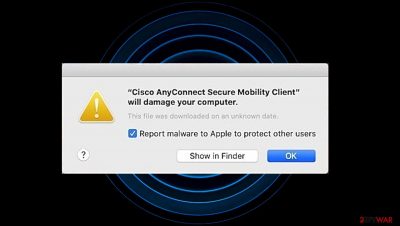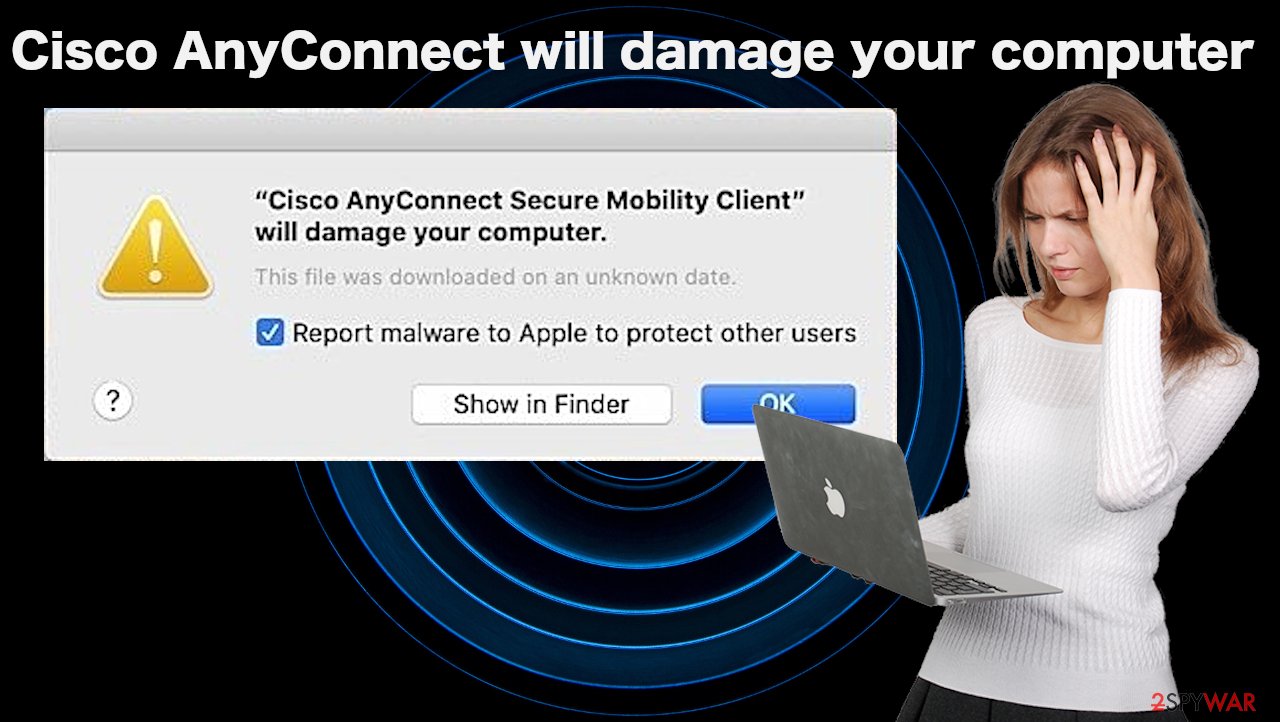Cisco AnyConnect will damage your computer (spam) - Free Guide
Cisco AnyConnect will damage your computer Removal Guide
What is Cisco AnyConnect will damage your computer?
“Cisco AnyConnect will damage your computer” pop-up is the mac virus that affects the speed of the machine

Cisco AnyConnect will damage your computer message states about the potential danger to your operating system and functions, but it is possible that the program indicated on the message is a PUP. Even users[1] report the suspicious warning pop-up that constantly appears on the machine. It can be related to the particular program named in the message and compatibility issues or the need for an upgrade. You shouldn't panic when the pop-up appears, but PUP[2] can affect more crucial parts of the system if the problem is not getting fixed as soon as possible.
This particular pop-up message with a warning is the part of an occurring issue with “Cisco AnyConnect Secure Mobility Client will damage your computer” “will damage your computer” alerts that people encounter all the time. The issue is overwhelming and frustrating for users because the warning seems convincing and alerting enough to panic about the state of security. This is a false warning campaign, and these issues were caused by PUPs, like the Adload family, closely related to issues on macOS devices and particularly targeting this type of machine. You can control these alerts and get rid of the intruder yourself.
| Name | Cisco AnyConnect will damage your computer |
|---|---|
| Type | Adware/ Mac virus/ PUP |
| Issues | Pop-up notifications affect the speed and performance of the machine, redirects, commercial content can lead to possibly dangerous material online |
| Related | Promotional material that pushes tools like Advanced Mac Cleaner, Mac Cleanup Pro |
| Distribution | Fake updates of Flash player, deceptive campaigns |
| Danger level | Low, but overtime more issues can be caused and lead to serious performance problems |
| Elimination | You can remove the responsible programs with anti-malware tools |
| Repair | You should check the machine for possible damage and virus leftovers with FortectIntego |
Cisco AnyConnect will damage your computer campaigns can be used to distract your attention from the additional activities related to commercial content, adware-type intruder features. There are many data tracking tools that PUP creators and scammers can use. Experts[3] always note that online content can always be dangerous on various levels.
The message about a particular file or program and the need to take it to the trash appears out of nowhere, mentions various application names, and bothers users to increase the chances that the pop-up receives interaction and redirects can be delivered. Potentially unwanted programs mainly rely on such deceiving techniques that allow exposing people to sponsored material.
The main goal of the adware program that is related to these alerts can be collecting views and clicks on promotional pop-ups, redirects, banners. Also, Cisco AnyConnect will damage your computer pop-up campaigns can show promotional content pushing useless macOS optimization tools and tricking users into paying for such installs.

Dealing with false warnings and alerts
These warnings and pop-ups might fill up the screen, occur at the worst moments to keep you from accessing the normal material online. The application can do more than affect the browsing experience. Cisco AnyConnect will damage your computer PUP can change various settings on the machine and affect the performance that way.
Also, any intruder that is active on the machine already affects the state of security because potentially unwanted applications can attract or even directly install other intruders on the computer. This is the reason why removing the infection is very crucial. It can be done using a proper anti-malware tool SpyHunter 5Combo Cleaner or Malwarebytes. You can also try to get rid of the shady piece manually.
Remove items from the Applications folder:
- From the menu bar, select Go > Applications.
- In the Applications folder, look for all related entries.
- Click on the app and drag it to Trash (or right-click and pick Move to Trash)
![Uninstall from Mac 1 Uninstall from Mac 1]()
To fully remove an unwanted app, you need to access Application Support, LaunchAgents, and LaunchDaemons folders and delete relevant files:
- Select Go > Go to Folder.
- Enter /Library/Application Support and click Go or press Enter.
- In the Application Support folder, look for any dubious entries and then delete them.
- Now enter /Library/LaunchAgents and /Library/LaunchDaemons folders the same way and terminate all the related .plist files.
![Uninstall from Mac 2 Uninstall from Mac 2]()
Mac malware is a real threat
Many people can claim that macOS- based devices are immune to threats like this, but the existence of PUPs, mac scams, and fake optimizers, campaigns like Cisco AnyConnect will damage your computer, show that it is not true. There are tons of cyber infections specifically designed to affect these machines.
The distribution techniques may vary from the Windows-based threats, but this is a real issue, and common users do not pay enough attention to risks while being online, so these PUPs and other malware can find their way on the so-called secure machines. The most common way to spread mac infection – fake flash player updates, online sites, push notifications, redirect threats, and sites with ad-tracking functions.
Software installation from random ads and pages, pirating platforms is a universal issue affecting macOS too. “Cisco AnyConnect Secure Mobility Client will damage your computer” can appear after some installation of the program, direct adware. PUP developers get smarter and take advantage of various known users' habits.
You might be the one that skips through installation options and chooses Quick install all the time. This is a common but crucial mistake because you allow all pre-packed pieces to get installed this way. Freeware gets often bundled with adware, hijackers, other types of PUPs, and malware. Go for the Advanced option to stop the process before it even started. You can deselect the shady apps from the list.
As you can see, it is possible to avoid PUPs and adware-type intruders, even on macOS. “Cisco AnyConnect Secure Mobility Client will damage your computer” can also be removed. However, that is into that easy. You need to change particular issues with the machine when the PUP alters settings and preferences on the system level or in the browser directly. The guide below tells you how.
You may remove virus damage with a help of FortectIntego. SpyHunter 5Combo Cleaner and Malwarebytes are recommended to detect potentially unwanted programs and viruses with all their files and registry entries that are related to them.
Getting rid of Cisco AnyConnect will damage your computer. Follow these steps
Remove from Mozilla Firefox (FF)
Remove dangerous extensions:
- Open Mozilla Firefox browser and click on the Menu (three horizontal lines at the top-right of the window).
- Select Add-ons.
- In here, select unwanted plugin and click Remove.

Reset the homepage:
- Click three horizontal lines at the top right corner to open the menu.
- Choose Options.
- Under Home options, enter your preferred site that will open every time you newly open the Mozilla Firefox.
Clear cookies and site data:
- Click Menu and pick Settings.
- Go to Privacy & Security section.
- Scroll down to locate Cookies and Site Data.
- Click on Clear Data…
- Select Cookies and Site Data, as well as Cached Web Content and press Clear.

Reset Mozilla Firefox
If clearing the browser as explained above did not help, reset Mozilla Firefox:
- Open Mozilla Firefox browser and click the Menu.
- Go to Help and then choose Troubleshooting Information.

- Under Give Firefox a tune up section, click on Refresh Firefox…
- Once the pop-up shows up, confirm the action by pressing on Refresh Firefox.

Remove from Google Chrome
Delete malicious extensions from Google Chrome:
- Open Google Chrome, click on the Menu (three vertical dots at the top-right corner) and select More tools > Extensions.
- In the newly opened window, you will see all the installed extensions. Uninstall all the suspicious plugins that might be related to the unwanted program by clicking Remove.

Clear cache and web data from Chrome:
- Click on Menu and pick Settings.
- Under Privacy and security, select Clear browsing data.
- Select Browsing history, Cookies and other site data, as well as Cached images and files.
- Click Clear data.

Change your homepage:
- Click menu and choose Settings.
- Look for a suspicious site in the On startup section.
- Click on Open a specific or set of pages and click on three dots to find the Remove option.
Reset Google Chrome:
If the previous methods did not help you, reset Google Chrome to eliminate all the unwanted components:
- Click on Menu and select Settings.
- In the Settings, scroll down and click Advanced.
- Scroll down and locate Reset and clean up section.
- Now click Restore settings to their original defaults.
- Confirm with Reset settings.

Delete from Safari
Remove unwanted extensions from Safari:
- Click Safari > Preferences…
- In the new window, pick Extensions.
- Select the unwanted extension and select Uninstall.

Clear cookies and other website data from Safari:
- Click Safari > Clear History…
- From the drop-down menu under Clear, pick all history.
- Confirm with Clear History.

Reset Safari if the above-mentioned steps did not help you:
- Click Safari > Preferences…
- Go to Advanced tab.
- Tick the Show Develop menu in menu bar.
- From the menu bar, click Develop, and then select Empty Caches.

After uninstalling this potentially unwanted program (PUP) and fixing each of your web browsers, we recommend you to scan your PC system with a reputable anti-spyware. This will help you to get rid of Cisco AnyConnect will damage your computer registry traces and will also identify related parasites or possible malware infections on your computer. For that you can use our top-rated malware remover: FortectIntego, SpyHunter 5Combo Cleaner or Malwarebytes.
How to prevent from getting adware
Stream videos without limitations, no matter where you are
There are multiple parties that could find out almost anything about you by checking your online activity. While this is highly unlikely, advertisers and tech companies are constantly tracking you online. The first step to privacy should be a secure browser that focuses on tracker reduction to a minimum.
Even if you employ a secure browser, you will not be able to access websites that are restricted due to local government laws or other reasons. In other words, you may not be able to stream Disney+ or US-based Netflix in some countries. To bypass these restrictions, you can employ a powerful Private Internet Access VPN, which provides dedicated servers for torrenting and streaming, not slowing you down in the process.
Data backups are important – recover your lost files
Ransomware is one of the biggest threats to personal data. Once it is executed on a machine, it launches a sophisticated encryption algorithm that locks all your files, although it does not destroy them. The most common misconception is that anti-malware software can return files to their previous states. This is not true, however, and data remains locked after the malicious payload is deleted.
While regular data backups are the only secure method to recover your files after a ransomware attack, tools such as Data Recovery Pro can also be effective and restore at least some of your lost data.
- ^ AnyConnect malware error on MacOS. Spiceworks. Community forum.
- ^ Potentially unwanted program. Wikipedia. The free encyclopedia.
- ^ Virusai. Virusai. spyware related news.












